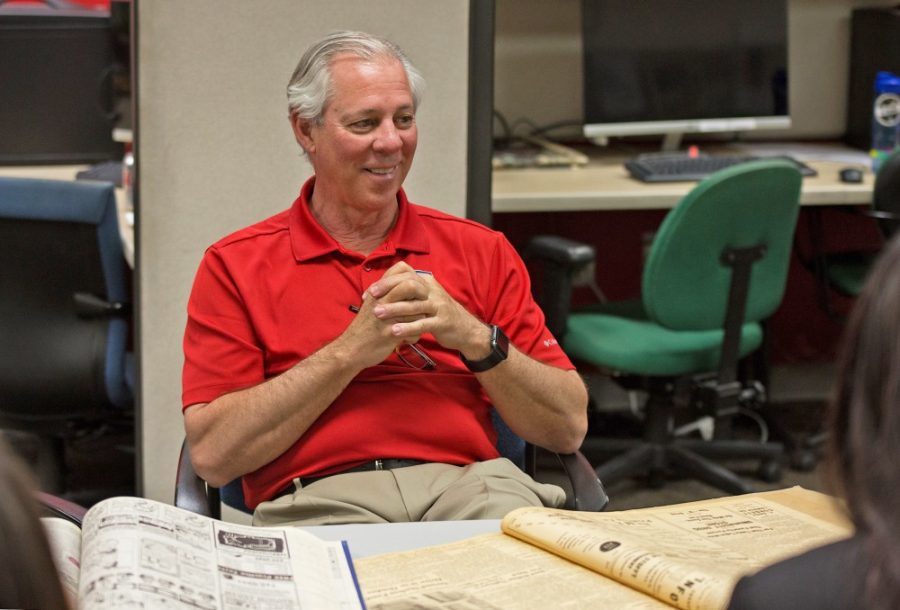On Dr. Robert C. Robbins’ first day at his new job as president of the UA, editors of the Daily Wildcat had an opportunity to sit down with him and ask questions about his background and interests.
Read the following Q&A to discover a few fun facts about our new president and how he is fitting into the Wildcat lifestyle thus far.
Daily Wildcat: Have you had much time to explore Tucson and downtown?
Robert Robbins: I have … I think it’s aspirational, and the vibe that I get … is that Tucson is going to be the next Austin. It’s going to be focused on food and music. I have not been to a live performance yet, but I love live music, so I can’t wait to hang out and listen to some good music downtown.
What kind of music do you like?
Pretty much everything, but I have to say hard rock … Rolling Stones and Van Halen, to “Fiddy” and all the new stuff that my kids have introduced me to. I like all music — not particularly a big fan of country/western, even though I grew up in Mississippi.
Do you have a favorite season? A favorite [Wildcats] player?
I always liked Mike Bibby, he was a great player. Coach Olson, of course, was a class act. I guess, not as much for his ability but for his colorfulness, Tom Tolbert, because he has a radio show in the Bay Area that I listen to all the time. Luke Walton, he’s quite a character.
And also, Sean Elliott, because he ended up getting a kidney transplant. Since I was in the transplant world for a long time, I thought that was kind of cool.
RELATED: Robbins to receive $200k from anonymous UA Foundation donors
How was it, living on campus?
Love it. I absolutely love it. That is one of my biggest disappointments — there’s not a president’s home on campus. So, I very much want to be on campus, and if that’s not possible, then as close to campus as possible so that I could walk, or bike or skateboard.
We’re curious to hear more about your “stealth” visits, why you chose to come here “incognito,” how many [visits] you took and what you did.
I think I made four [visits], and I did them on the weekends because that’s when I had time; it was a two-hour flight from Houston. I would come in Friday afternoon and I would just walk around the campus … I would basically talk to students, and try to understand where they’re from, what they’re studying, why they chose the UA, and what could be done to make the university better.
I would always ask them, “Hey, I hear you guys are getting a new president, what do you think about that?” and they would say, “We don’t care, we don’t really know who the president is and it’s not going to change our lives.” That’s disappointing.
I hope that with the next president, they’ll know who they are. They’ll want to talk to them, and hopefully the next president can help change things and make it better.
What were your college days like?
I went to a small liberal arts college; total student body was 1,000 then and still 1,000 today … people in Mississippi would say it’s where the free-thinkers went to school. But, I was very focused, because I grew up in a really small town.
My grandparents raised me … we lived on the campus in a 100-year-old house … I was very motivated to get out of my little town and to do well. So, I thought there was no way I was ever going to make it to medical school unless I worked really hard, studied and only made A’s.
RELATED: Robbins confirmed as next UA president
What was your favorite class in college?
Physics. I was a chemistry major, and I loved that. Physical chemistry brought together physics and chemistry, but I just love classic physics … I remember back to how difficult school was, particularly biochemistry. I took a course in biochemistry in college, and then walked across the street and took the [same] course in medical school.
I think we had a much more extensive curriculum and much more rigorous … but also, there was a required six hours of fine arts, and I took an introductory to theater class. I had never been to a play ever in my life … so, that definitely changed my life and opened things up.
What are some of your tips to UA students to be successful here
Take advantage of the incredible institution that this is; think big, study hard, try to make friends and learn from people who don’t necessarily come from where you come from … It’s a chance to explore new things, take chances … I would focus on being as broad as possible, because I think with the ever-changing, rapid world that we live in, the wider your breath of education, the better you’re going to be because things are going to change so quickly.
You’re going to have to have flexibility in what you learn and what your interests are. To remain intellectually curious, not only now but for the rest of your life. To be culturally competent, learn a little bit about as many different people as you can, because once you leave, you’re going to go out into the world and it’s going to be very competitive and diverse.
Follow Kathleen Kunz on Twitter.









